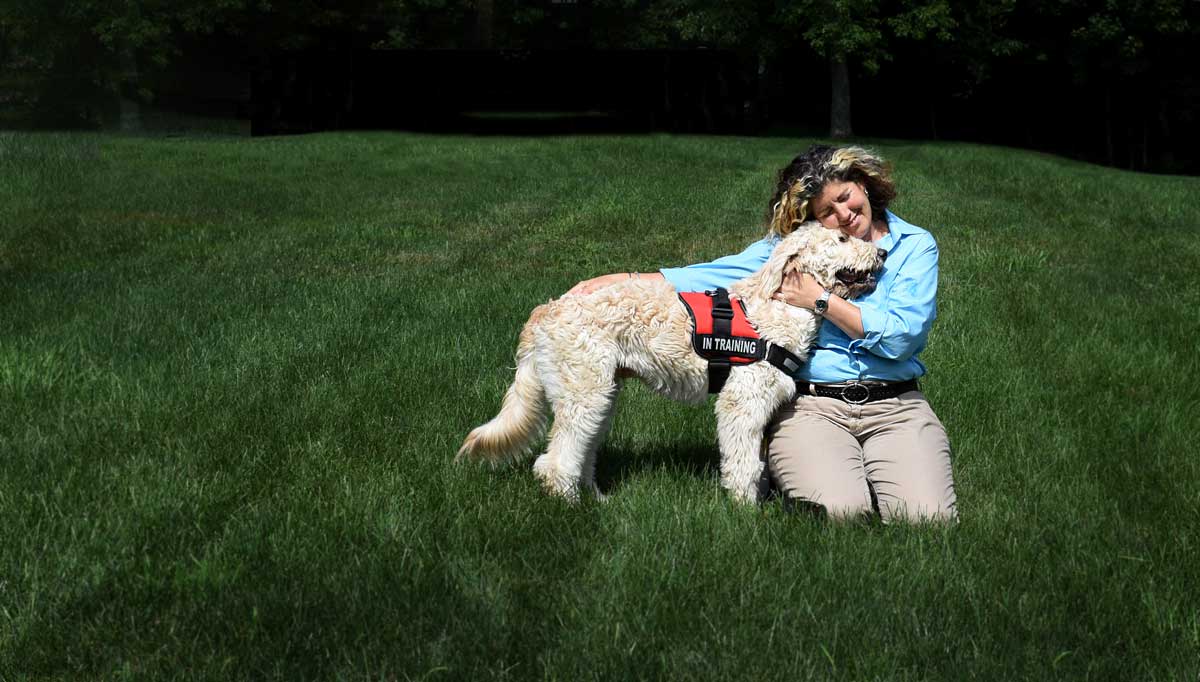About Us
what we are about
Types of Service Dogs
Psychiatric Service Dogs
Psychiatric Service Dogs assist those with “invisible disabilities” such as post-traumatic stress disorder (PTSD), chronic depression, bipolar disorder, anxiety disorders, social phobias, autism, developmental delays, and traumatic brain injury (TBI). Many of our applicants have experienced trauma from physical or sexual abuse or assault, suffer from anxiety or social phobias that limit their independence and capacity to function in public, have trauma from combat (veterans), or suffer from chronic psychiatric conditions that have limited their ability to thrive in society. Service tasks taught for such conditions include: signaling for behavior, such as nudging when dissociative behavior begins; standing between the guardian and others when in public to increase personal space; performing behaviors that give the appearance of being protective, such as “watch my back” (though service dogs are never taught to actually be protective or perform guarding behaviors); turning on lights before entering a dark room; deep pressure therapy; entering and searching a home before the guardian enters; interrupting panic attacks in a way that ‘grounds’ the guardian in the moment; waking the guardian from nightmares; waking guardian from oversleeping; reminding guardian to go to bed; locating objects (keys, phone, car, etc.); interrupting repetitive or self-destructive behaviors; alerting guardian to unhealthy behaviors such as staying up to late or staying in one spot, unmoving for too long; or alerting others to an individual’s movements (as is common for children with autism or individuals with developmental delays.
Medical Alert Dogs
Medical alert service dogs learn specialized tasks in order to react to or prevent the symptoms of a variety of medical conditions. Services may include bringing a phone so that their guardian can call for help; staying by their guardian’s side; laying across their guardian’s body; pressing medical alert devices to notify others of their guardian’s condition; licking the face of semi-conscious or unconscious guardian in order to rouse them or finding another person to render assistance. Many dogs are able to warn their guardian of an impending medical event, such as a seizure, however, this is not something that can be trained until the dog shows a natural ability for understanding the event. If the dog does naturally alert their guardian, this behavior is reinforced to encourage it happening reliably.
Mobility Service Dogs
Diggity Dogs Service Dogs offer clients non-load-bearing mobility assistance, which includes a wide range of behaviors, but does not include the clients putting their body weight on the dog. Our mobility service dogs can find and bring belongings such as their phone, keys medication, shoes, or clothing to their handlers or help them get dressed/undressed. They can also retrieve dropped items, turn on lights, open doors and drawers, or assist with chores, such as doing the laundry.
My service dog has done more for me than medication and therapy combined.
Our Mission
Diggity Dogs Service Dogs, a non-profit organization based in Greenfield, MA, provides service dogs and service dog training and support services. We develop dogs’ abilities to sense their guardian’s mental, emotional, neurological and/or physical needs and respond in ways that enable our clients to cope with and overcome challenges that they experience. We create cooperative and mutually beneficial relationships with dogs that provide invaluable assistance to disabled individuals.
Our Methods
We facilitate and encourage trusting relationships between dogs and humans based on understanding, communication, and appreciation. All training and care provided for dogs is done with compassion, patience, and care. Dogs should never be forced, dominated, intimidated, emotionally harmed, physically harmed, or punished. Every effort is made to more fully comprehend the way that dogs perceive and experience the world so that we may employ the most effective methods of communication possible. We remain vigilantly cognizant of dogs’ dependence on man and consider it our responsibility to provide for their physical, mental and emotional health. Great lengths are taken to ensure our dogs are provided with the experiences and care required to ensure that they may live free from fear and are always treated with sensitivity, gratitude and reverence.
